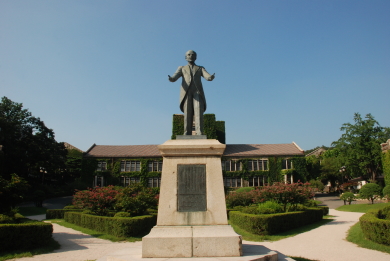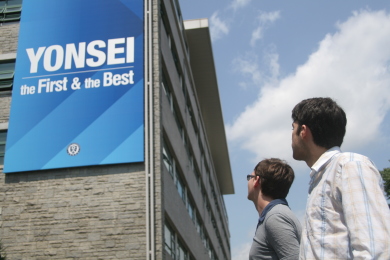For appropriate Inbound Globalization
 |
Admission process
International and *Jaeoegukmin* students willing to enter Yonsei Univ. go through a document review, and then an interview. The document review includes junior high and high school academic performance, foreign language proficiency certification, recommendations, a personal statement, and other documents that can certify extra-curricular activities from high school (SAT, ACT, GCE-A LEVEL, IB, AP, etc). Students who have been selected from the document review proceed to an interview. Each student is then scored for the interview. Eventually, final admissions are given to the top scoring students combining the scores from the 1st and 2nd rounds of the selection process. Then, the Korean Proficiency Test is mandatory to take for the finalists to prove that they have adequate Korean ability. If one gets lower than a level six, the highest level, he or she must take less credits than the amount of the normal Yonsei students (level one to two: less than three credits; level three: less than six credits; level four: less than nine credits; and level five: less than twelve credits).
Evaluation of the student’s Korean ability occurs “after” the student’s admission to the university, however. This increases the possibility of risk for the students to have a harder time adapting to the language, and eventually their studies, in Korea. “It is hard for us to demand of the students a certain level of Korean. We try to disregard the evaluation of the student’s Korean ability because it is hard to evaluate the students from all different kinds of countries with just one kind of prerequisite.” said Yu Yeon-sook (Manager, Office of Admissions). Yu continued, “That is why the Office of Admissions selects students who had excellent results during junior high and high school. Then, the students are managed within their colleges to educated in Korean and adapted to the culture.”
Life and study in Korea
Admitting International and *Jaeoegukmin* students to the university without strict restrictions due to lack of Korean does not set a perfect start for the students to study in Yonsei and in Korea. Getting adapted to a whole new environment takes time, and learning a language in order to take classes in that language also takes more time. “International and *Jaeoegukmin* students usually come see me because of their difficulties regarding studies. Students find their classes hard to follow not only because the classes are in Korean, but also because of the style of the class that may be difficult and different to them. For example, the students lack the ability to catch hold of each professor’s style of teaching,” says Kim Hyun-sang (Academic Advisor for International and *Jaeoegukmin* students).
Several misconceptions and biased opinions also exist on the campus. This eventually separates the students into groups, rather than uniting Yonsei students through “Inbound Globalization”. In the worst case, some of the other Yonsei students have opinions about these students that they were admitted to the university because of the help of their parents in living abroad. They say that this is an advantage for them to get admitted more easily. There are also students like Hah Min-cheol (Soph., Dept. of Philosophy), however, who says, “It seems like International and *Jaeoegukmin* students have the advantage to get admitted to universities because they have a proficient skill in a foreign language. But I believe it is also because universities wish to maintain a certain percentage of students who are skilled in foreign languages to make a more globalized country.” Matsuno Ko (Dept. of Communication), an international student, says, “Some students have a tendency to judge others by their level of language. That is, if a student speaks Korean poorly with clumsy expressions, the others tend to think of the student as a tactless person. My international friend from the Dept. of Engineering speaks really poor Korean, but she is supposedly getting all “A+” in her classes.
School services
There are several services provided by the university to assist International and *Jaeoegukmin* students, besides mandatory Korean Writing classes. They include the Global Tutoring Program, academic advisors especially for these students, and also various student organizations and clubs such as Mentors’ Club and International Yonsei Community (IYC).
The Global Tutoring Program has been provided by the Center for Teaching and Learning (CTL) since 2003. This program provides a one-on-one tutor for a tutee and makes sure that the student can be advised with help on their studies and lives on campus as much as possible. It is a problem that not many students know about this program since it is just an option for the students to find on their own, however. “The information is always up on the CTL website, and also emailed to every student when the application period begins. However, not many students know what kind of program this is, and mostly, I think the students set the mails as spam,” says Hwang Eun-young (Senior Researcher, CTL). It is also a problem that the tutors have a hard time because it takes more than the requested time for tutoring, which is 30 hours, to prepare for each meeting.
While at Yonsei, students have regular individual meetings with their academic advisors about course selections, career exploration, and various other issues. The academic advisors help them to go above and beyond for the students’ academic success in Yonsei Univ. An Academic advising orientation specially designed for International students and *Jaeoegukmin* students is also held within the first week of the first semester in which seniors can give advice. “Every International and *Jaeoegukmin* student has a hard time at first, but there are students who overcome those obstacles quickly and spend a fun college life. On the other hand, there are also students who group themselves, preventing themselves from interacting with other students. This brings the students into a more critical point of going through a harder college life in Korea,” says Kim (Academic Advisor for International and *Jaeoegukmin* students). Listening attentively to the advice the academic advisors give, is the key to a more satisfying and adventurous college life on campus.
Simple but hard: Solutions
We have to remember that “Inbound Globalization” is the main objective for the admission of International students and *Jaeoegukmin* students. As recently as three to four years ago, these students were not even part of the school’s focus. The school barely paid attention to them; however, it has begun to make improvements, like establishing several programs, classes, academic advisors, and clubs especially for these students. Continuous efforts to enhance these will lead eventually to a better situation. It is just a matter of mustering the efforts from each Yonseian and enacting some changes for the particular problems.
First, it is most important to have the students prepared as much as possible before they are admitted. Other universities like Tsinghua Univ. and Tokyo Univ., the most famous universities in China and Japan, set their language as a prerequisite element in the admission for international students. Language proficiency tests such as Hanyu Shuiping Kaoshi (HSK) and Japanese Proficiency Test (JPT) are required at a certain level “before” the admissions. Kim (Academic Advisor for International and *Jaeoegukmin* students) says, “In my opinion, I do believe that it is right to have a certain process including a test and score level for International and *Jaeoegukmin* students before they are admitted to Yonsei Univ.” It is obvious that applicant numbers would decrease then, but it will certainly encourage the applicants to study sufficiently before entering. This would decrease existing problems, making Yonsei better, and the best place where anyone can study and prosper.
Second, it is a matter of the students taking as much interest and being as informed as possible about the various supports they can contribute to and benefit from. The Global Tutoring Program can turn into a very beneficial program for every student on campus, if just a simple effort actively is made. “It has been almost five years now since I have seen this program start, and I believe this program is something that surely benefits the students in various ways. It would be so beneficial if it was institutionalized for at least a semester or a year,” says Hwang (Researcher, CTL).
Third, having biased opinions of each other is the most fatal blow to Inbound Globalization of the university. “There are misconceptions that International and *Jaeoegukmin* students are admitted easily to the university. It is true the university gives such an opportunity for the students to come to Yonsei even though they have a lower academic level than the students in Korea. However, I am sure that these students would have reached the level to come to Yonsei Univ. even though they have studied in Korea,” says Jung Dae-shik (Senior Coordinator, Office of Admissions). Moreover, Kim, the academic advisor, gave his remarks on how other Yonsei students, and International and *Jaeoegukmin* students should behave. He says, “I hope Korean students become more magnanimous and broad-minded about diverse races and cultures, and recognize these students as a part of the Yonsei community with an open heart. For the International and *Jaeoegukmin* students, they should be eager and zealous to figure out the problems they need to address. They have to stand up on their own and get a hold of anyone in school, and also participate eagerly when there are any school events.”
Yonsei Univ. has been striving greatly to prepare as a community for increasing globalization. Welcoming students from diverse countries is one of their efforts, which starts with Inbound Globalization at Yonsei. Though the plan is great, coping with it is still proving difficult. As mentioned above, just simple efforts from both the school and the students will gradually produce a dazzling outcome. International and *Jaeoegukmin* students along with all the Yonsei students should unite into one, and benefit from each other as much as they can to achieve the “First & the Best” Yonsei.
 | ||

